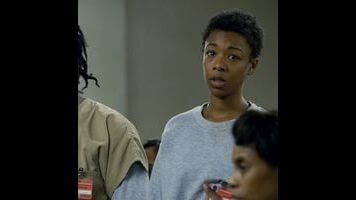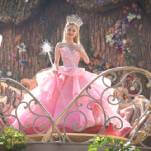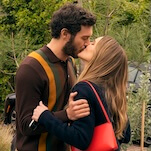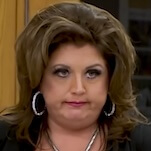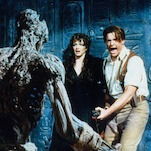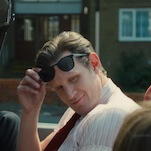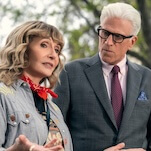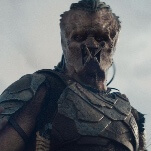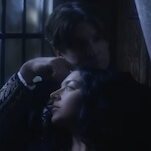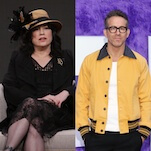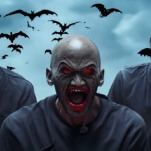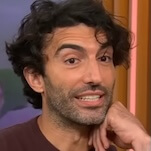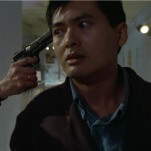The peril, though, is that these details—sent to critics before they’ve had a chance to watch the episodes—are themselves spoilers. And while I avoided reading the entire list lest I spoil myself further, I couldn’t help but read the very first line: “Any references to a character’s death—episodes 1 and 12.” (I won’t say if there was also a note for Episode 13). And while I wish I could have been able to forget about that, it stuck with me as I went through screeners. I knew that someone was going to die in “The Animals,” and your mind works differently when you have that type of context. I did not have had the show “spoiled”: it is not shocking to think that there could be a character who dies on this show in general, in particular given the context of this season. However, I undoubtedly saw the season through a different lens knowing that its penultimate episode would be built around that death—any degree of certainty reshapes how narratives are experienced, and it was a hard thing to shake, as I imagine it was for anyone who only got to this episode after reading headlines that teased a major episode for Poussey’s character, or a major death at the end of the season, or just flat out spoiled it through one thing or another.
Ultimately, Poussey’s tragic death was not without foreshadowing. As I noted earlier in the season, her storyline with Brook had no clear source of conflict for too long: we kept getting glimpses of the two characters’ romance after the initial bump in the road, with no other purpose than to show us their quiet, innocent relationship. And so that couldn’t help but be in the back of my mind when we get to “The Animals,” and Poussey is suddenly the only character thinking about the future: while every other person who entered Lolly’s time machine or answered the time travel-related hypotheticals floating around thought about what they would go back and change, Poussey was thinking ahead to ten years from now, which marked her for death almost immediately. Throw in some tensions with Brook that add to the layer of tragedy, and it wasn’t necessarily shocking that Poussey found herself trapped under Bayley’s knee in the midst of the peaceful protest turned “riot” after Piscatella fights to take control.
By comparison, there was really no logic for Bayley being the one responsible before this episode, but the episode does the work there as well. Flashbacks remind us how innocent Bayley was, hanging around with some lunkhead friends and stumbling his way through a water tower arrest and some juvenile egg-throwing—it was not long ago that he was in high school, and with no conception of what it meant to be in a position of authority, or what type of respect these inmates might deserve. And because he was so young, he never had a chance to learn it: Caputo was too busy dealing with corporate, and the incoming guards—led by Piscatella—were so militant that Bayley never got to feel like his humanity was welcome in the workplace. He knew enough to know that what he saw with Suzanne and Maureen was wrong, but he wasn’t confident enough in his convictions to quit, accepting that maybe this wasn’t the right place for him. Bayley is young enough that he doesn’t know who he is, and so he wonders if the corruption is his own fault: either for being too stupid to avoid it, or by being so innocent that he doesn’t understand how normal he is. Bayley has never had any idea what he was doing, and this seems like a facile flashback until you realize that he’ll be the one who inadvertently suffocates Poussey Washington in the midst of an altercation with Suzanne.
Bayley is responsible for his actions, but this was obviously not something he did on purpose. None of the guards were trained to deal with Suzanne (especially not as a human being, and not even as the animal they treat her as), and it was certainly not Bayley’s fault that Suzanne had been left in such a post-traumatic state by Humphrey. Bayley responded to Poussey’s attempt to help Suzanne like a guard typically would, but then he lost track of his surroundings—the direction (from Mad Men creator Matthew Weiner) captures the chaos not as an excuse for Bayley’s actions but as an explanation. Bayley was supposed to be one of the good ones. Bayley wasn’t supposed to be at the center of a riot like this one, but he was because that’s what happens. While some of the mistreatment experienced by inmates comes at the hands of people like Humphrey, or under the direct leadership of Piscatella, it’s just as likely that a poorly trained guard who was never suited to the position will be put in a bad situation by a culture of mistreatment, and something tragic will happen.
Although choreographed, the tragedy resonates. Poussey is the most significant character to ever die on this show: we have experienced her past, seen her arc develop, and always understood her to be someone who is decent, kind, and generous. She is someone who has gone through ups and downs with the support of her prison family, and who has always registered as sympathetic even when going through those rough times, never abandoning her friends even when they abandoned her. This is not a villain being run over, or an inmate we’ve only spent a short time with committing suicide: this is a person who we have come to know, seen grow, and now mourn.
As is often the case, we can ask ourselves if they could have killed another character, and recent controversies surrounding the death of lesbian characters on television have emerged around Poussey much as they did around The 100 or The Walking Dead (The Hollywood Reporter asked Wiley about it here—spoilers for the finale). However, this doesn’t feel like the same kind of situation: not only does the show have a substantial ensemble of lesbian characters, but it also gave Poussey a full and complete arc that in no way feels defined by her death. She is collateral damage insofar as her death can be pinned on the fundamental mismanagement of Litchfield, but her death does not feel random, and will not solely resonate as “a death” in the context of the narrative: that she was a woman of color will matter deeply in the context of the show, and that’s an important detail. While the context-free spoiler might have shaped my experience with the season in vague ways, Poussey’s death affects the season in concrete terms, and the tragedy that stems from it feels propulsive and necessary in the story being told.
That having been said, however, “The Animals” doubles down on the villainy of Piscatella and Humphrey, and I have to admit that it did not work for me. Throughout the season, there has been an unspoken reality that Piscatella did not see the inmates as people, and that was fine: he came from Max, and that comes with different philosophies that we knew would have long term consequences. But as Piscatella starts announcing this to everyone, and actively undermining Caputo’s authority and refusing to allow Humphrey to be suspended, Piscatella turned into one of my least favorite character types: the House villain. If you watched the show House, you may recall a series of characters—Chi McBride and David Morse were the two most prominent—who came into the show and saw the way House was running his diagnostic unit and saw everything that was wrong. He was reckless and rude, and they didn’t care about how many cases he solved or people he helped—he had to be stopped.
The idea that House’s methods were unorthodox was baked into the show, and made sense as a point of tension between House and his interns, or his fellow doctors. But when you try to turn that objection into a person, they become extremely one-dimensional—they solely exist to create conflict, and their specific motivations often melt away in favor of empty antagonism. And while Piscatella has been slightly more fleshed out—they made him gay, for example—I still don’t entirely know where his militancy stems from. It seems solely to exist because it flies in opposition to how we feel about these inmates after four seasons with them—he doesn’t think they’re human beings, and the whole premise of the show is seeing inmates as human beings, and the intensity of that opposition has overshadowed any character development they intended for this “villain.”
Orange Is The New Black has only really had one villain: while characters like Red and Maria have emerged as antagonists (and that last one still gives me pause, as I’ve discussed in the past), only Vee emerged as an outright villain, and even then she had considerable backstory, relationships with multiple characters, and a motive that went at least a bit beyond fostering chaos. And while MCC is certainly the “big bad” in terms of its narrative impact, and guards like Humphrey, Stratman, and Dixon are odious beings that read as villains on some level, they boil down to causes and effects: MCC as the cause through their penny-pinching and inhumane policies, and the military guards as people brought into the prison to save money instead of actually helping keep the peace and complete the project of rehabilitation. But Piscatella isn’t a direct cause of MCC in the same way, nor have his personal motivations ever made any particular sense: he exists to represent an idea, which worked fine until he started loudly yelling that idea. I wanted that character to become more complex in emerging as such a debilitative presence, but he seemed to flatten instead, and I felt that could have been more productively handled.
Although the choreographing on Poussey made her the most likely victim, the episode has its fair share of reconciliations which could have signaled similar tragedy: Piper and Alex reunite in hopes of things smoothing over, Pennsatucky and Boo come to terms with the personal nature of forgiveness and suffering, a returned Sophia accepts Gloria’s help bringing her hair back to life, and the racial struggle that has divided Litchfield all season finally begins to settle when they realize they share a common enemy. But despite the talk of peaceful protest, and the hope that collective action could make a difference, there is no happy ending. There was never going to be anything other than chaos given MCC’s control, and given what we know their hope seems both admirable and futile: we know that there are more inmates being moved into those new dorms, we know how much it took MCC to release Sophia, and we knew that Caputo would have probably been powerless even if he had been there to supervise Piscatella the night before.
I can’t know for sure, but even if I hadn’t known that someone was going to die in “The Animals,” this was what the season was always building toward. Yes, the characters veer away from a race war, and Sophia escapes solitary confinement, meaning that some of the worst case scenarios we could have imagined throughout the season are avoided; however, ultimately, this season could not have gone by without a tragedy of this magnitude. Something had to give, and while there could have been some better balance in characterization, the haunting fade to black inspired the type of silent anger and disbelief that should come from a story decision of this magnitude. Poussey Washington did not deserve to die, Bayley should have never been in the position to suffocate her, and those facts will carry with the show no matter what fate befalls Litchfield in the finale or the three seasons that will follow.
Stray observations
- I was intensely glad that it was Taystee who was by Poussey’s side as the camera panned upward: while the season focused primarily on her romantic relationship with Brook, that friendship was one of the show’s finest, and will be missed. However, it also seemed like it wasn’t a big part of this season, which is something that might have been recalibrated. Separating Taystee in her receptionist job was good material for Danielle Brooks, but it robbed us of some friend time for these two.
- For the record, Netflix also didn’t want reviewers to mention the character death in episode one, the fact an inmate would be released, the riot in this episode, and Suzanne and Maureen’s fight in the previous episode.
- After a season of inmates never saying guards’ names (as I’ve noted a few times), it was super weird to hear them suddenly using Humps and Stratman’s names in signaling them out.
- Healy checking himself into an inpatient psychiatric facility is certainly a turn, although it will be interesting to see what comes of it: that’s three different characters taken to some version of Psych, but is he actually sick, or just believing that his failures are genetic?
- Meanwhile, I find myself struggling with what the show wants us to be taking from Morello’s behavior here. Seeing her revert back to her delusions—her intense jealousy, and her choice to believe they’re trying for a baby—raises questions for me about whether she suffers from a specific mental illness, and at what stage her level of delusions (versus just choosing to live in a fantasy) would qualify for more than general diagnosis. It’s a fine line, which I think might be the point, but it’s still a bit muddled for me.
- Interesting to see Matthew Weiner dealing with a series other than this own—my favorite shot was the egg dripping off the “Neighborhood Watch” sign, but it was a well directed episode on the whole, and that final shot was haunting.
- Never would have predicted early on in the show’s run that I’d be glad to have Fig back, but I thought Caputo’s apology reflected how deep he’s going in his introspection, and also how futile the whole thing is.
- In addition to being part of Poussey’s tragic foreshadowing—offering her a job when she gets out—Judy King also reveals to her lawyer that she has been under the impression she was getting early release, hence why she’s been as pleasant as she has been, why she would offer Poussey a job (which she probably wouldn’t have followed up on), and also why she’s withholding the money from the tabloid image from her would-be friends. We’ll see if she’s being set up for a fall in the finale, but it was notably one of the first scenes where we’ve seen Judy King on her own.
- I was struck by the moment when Coates lies to Bayley about having never been tempted into the life of sin that prison could inspire—would connecting over that have made Bayley feel more normal, and at ease? Could it have made any difference? I don’t know, but I’m still thinking back to it.
- I’ll be curious to see if there’s any type of reflection from the producers regarding Poussey’s death (I write before the season premieres, and weeks before this will post)—in the age of the “postmortem,” we often get a lot of discussion about how TV deaths came to be, but Kohan hasn’t done interviews for the show in a long time, and I don’t think anyone has decided when it’s right to do interviews with actors given the timing. But if there’s an interview with Samira Wiley available by now, I’ll come back and edit and link to it. (Edit: Well, as many of you probably discovered, the answer here was a mess in terms of spoilers: Vulture posted their Wiley interview fifteen hours after the season premiered, while most stuck to what I understand to be a Monday embargo. Let’s not reward Vulture’s thirst to be first: check out The New York Times’ interview with Wiley and writer Lauren Morelli.)
